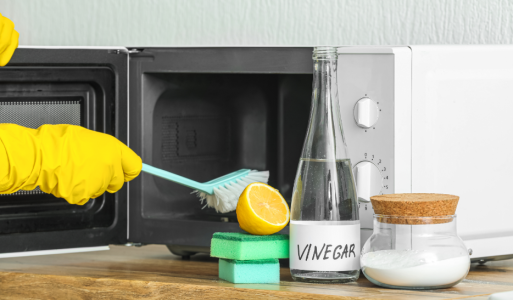Mixing These 11 Cleaning Agents Could Be Disastrous – Find Out Why Before It’s Too Late!
By
Gian T
- Replies 0
As we age, we often become more invested in maintaining a clean and healthy home environment. It's a point of pride and comfort; let's face it, there's a certain satisfaction in seeing your living space sparkle. However, in our quest for cleanliness, we must be cautious. The adage 'more is better' doesn't always apply, especially when mixing cleaning products. Some combinations can be downright dangerous, posing serious threats to our health and safety.
At the Seniors Discount Club, we understand the importance of keeping your home in tip-top shape while ensuring your well-being. So, before you don your rubber gloves and start tackling that stubborn grime, let's explore why mixing certain household cleaners can lead to disastrous results.
1. **Bleach and Vinegar**: This duo might seem like a powerful grime-fighting team, but they produce chlorine gas when combined. This gas can cause coughing, breathing difficulties, burning, and watery eyes, even at low levels. It's a toxic mix that's best avoided.
2. **Bleach and Ammonia**: Found in many glass and window cleaners, ammonia, when mixed with bleach, creates a toxic gas called chloramine. This nasty combination can lead to symptoms such as shortness of breath, chest pain, and the same respiratory issues as the bleach and vinegar mix.
3. **Bleach and Rubbing Alcohol**: Perhaps you've heard of chloroform in old detective stories, but it's not something you want to create at home. Mixing bleach with rubbing alcohol can produce this highly volatile compound, leading to coughing, breathing problems, and eye irritation.
4. **Bathroom Cleaners and Bleach**: It's tempting to double up on cleaning agents for that extra shine, but many bathroom cleaners contain acids that, when mixed with bleach, can release chlorine gas, causing respiratory problems and irritation to the eyes and nose.
5. **Rust Removal Products and Bleach**: The best rust removers can do the job solo. When paired with bleach, they can release irritating and toxic gases that are harmful to your health.
6. **Lemon and Bleach**: Lemon is a wonderful natural cleaner, but it should never be mixed with bleach. When combined with bleach, lemon's acidic nature can produce chlorine gas, leading to the same dangerous effects as other acidic mixes.
7. **Oven Cleaner and Bleach**: Oven cleaners are formulated to be powerful. Mixing them with bleach can produce chlorine gas, which, as we've learned, is something to avoid at all costs.
8. **Drain Cleaner and Drain Cleaner**: Never mix two different drain cleaners or use one right after the other. These potent formulas could react violently, potentially leading to an explosion. If one doesn't work, calling a professional plumber is safer.
9. **Hydrogen Peroxide and Vinegar**: While these can be used sequentially for cleaning, never mix them in the same container. Doing so creates peracetic acid, a potentially toxic substance that can irritate the skin, eyes, and respiratory system.
10. **Baking Soda and Vinegar**: This combination is a popular DIY cleaning hack but is not as effective as you might think. The chemical reaction between the acidic vinegar and basic baking soda neutralises both, leaving you with mostly water and a little salt. The fizz might look impressive, but it won't do much cleaning.
11. **Vinegar and Castile Soap**: Instead of creating a super cleaner, mixing vinegar with castile soap results in a chunky, oily mess. The vinegar destabilises the soap, rendering it ineffective.
Understanding the chemistry behind these common household products is crucial for safe cleaning practices. Always read labels carefully and, when in doubt, stick to using one product at a time. If you're looking for a more potent clean, consider products specifically designed for tough jobs, or better yet, seek natural alternatives that can be just as effective without the risk.
 We'd love to hear from you, our wise and experienced readers. Have you ever had a cleaning mishap with mixed products? Or do you have any safe cleaning tips to share with the community? Drop your thoughts in the comments below, and let's keep our homes and ourselves safe and sparkling!
We'd love to hear from you, our wise and experienced readers. Have you ever had a cleaning mishap with mixed products? Or do you have any safe cleaning tips to share with the community? Drop your thoughts in the comments below, and let's keep our homes and ourselves safe and sparkling!
At the Seniors Discount Club, we understand the importance of keeping your home in tip-top shape while ensuring your well-being. So, before you don your rubber gloves and start tackling that stubborn grime, let's explore why mixing certain household cleaners can lead to disastrous results.
1. **Bleach and Vinegar**: This duo might seem like a powerful grime-fighting team, but they produce chlorine gas when combined. This gas can cause coughing, breathing difficulties, burning, and watery eyes, even at low levels. It's a toxic mix that's best avoided.
2. **Bleach and Ammonia**: Found in many glass and window cleaners, ammonia, when mixed with bleach, creates a toxic gas called chloramine. This nasty combination can lead to symptoms such as shortness of breath, chest pain, and the same respiratory issues as the bleach and vinegar mix.
3. **Bleach and Rubbing Alcohol**: Perhaps you've heard of chloroform in old detective stories, but it's not something you want to create at home. Mixing bleach with rubbing alcohol can produce this highly volatile compound, leading to coughing, breathing problems, and eye irritation.
4. **Bathroom Cleaners and Bleach**: It's tempting to double up on cleaning agents for that extra shine, but many bathroom cleaners contain acids that, when mixed with bleach, can release chlorine gas, causing respiratory problems and irritation to the eyes and nose.
5. **Rust Removal Products and Bleach**: The best rust removers can do the job solo. When paired with bleach, they can release irritating and toxic gases that are harmful to your health.
6. **Lemon and Bleach**: Lemon is a wonderful natural cleaner, but it should never be mixed with bleach. When combined with bleach, lemon's acidic nature can produce chlorine gas, leading to the same dangerous effects as other acidic mixes.
7. **Oven Cleaner and Bleach**: Oven cleaners are formulated to be powerful. Mixing them with bleach can produce chlorine gas, which, as we've learned, is something to avoid at all costs.
8. **Drain Cleaner and Drain Cleaner**: Never mix two different drain cleaners or use one right after the other. These potent formulas could react violently, potentially leading to an explosion. If one doesn't work, calling a professional plumber is safer.
9. **Hydrogen Peroxide and Vinegar**: While these can be used sequentially for cleaning, never mix them in the same container. Doing so creates peracetic acid, a potentially toxic substance that can irritate the skin, eyes, and respiratory system.
10. **Baking Soda and Vinegar**: This combination is a popular DIY cleaning hack but is not as effective as you might think. The chemical reaction between the acidic vinegar and basic baking soda neutralises both, leaving you with mostly water and a little salt. The fizz might look impressive, but it won't do much cleaning.
11. **Vinegar and Castile Soap**: Instead of creating a super cleaner, mixing vinegar with castile soap results in a chunky, oily mess. The vinegar destabilises the soap, rendering it ineffective.
Understanding the chemistry behind these common household products is crucial for safe cleaning practices. Always read labels carefully and, when in doubt, stick to using one product at a time. If you're looking for a more potent clean, consider products specifically designed for tough jobs, or better yet, seek natural alternatives that can be just as effective without the risk.
Key Takeaways
- Mixing cleaning products such as bleach with vinegar, ammonia, or rubbing alcohol can produce dangerous toxic gases.
- Combining household cleaners, especially drain cleaners or cleaners containing bleach, can result in harmful chemical reactions.
- Some combinations of cleaning agents, like baking soda and vinegar or vinegar and castile soap, are ineffective and counterproductive.
- It is important to use cleaning products as directed and avoid experimenting with mixtures that can cause health risks or damage surfaces.








